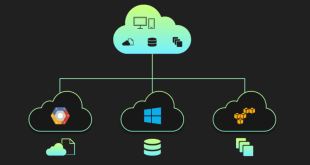In today’s fast-paced digital landscape, cloud computing has become the backbone of modern businesses, enabling efficient data storage, accessibility, and scalability. As cloud infrastructures grow in complexity, managing them effectively becomes a challenging task. However, with the emergence of AI-driven cloud orchestration, a new era of streamlined infrastructure management is upon us. In this blog, we delve into the transformative power of AI in cloud orchestration, exploring its impact on cloud computing services, infrastructure management, and the future of the technology landscape.
Understanding Cloud Computing and Its Evolution
Cloud computing, in simple terms, refers to the delivery of computing services over the internet. It has revolutionized the IT industry, offering businesses the ability to store and access data, applications, and resources on remote servers. The evolution of cloud computing has been remarkable, from early days of basic cloud services to the current multi-layered, complex infrastructures that drive digital transformation.
The evolution of cloud computing can be summarized as follows:
- Traditional Data Centers: Legacy data centers were expensive, space-consuming, and lacked scalability.
- Infrastructure as a Service (IaaS): The introduction of IaaS allowed businesses to rent virtualized hardware resources.
- Platform as a Service (PaaS): PaaS provided a development and deployment environment, further simplifying application development.
- Software as a Service (SaaS): SaaS enabled access to software applications over the internet, eliminating the need for local installations.
The Growing Importance of Cloud Computing Services
Cloud computing services have gained immense popularity due to their undeniable benefits. As organizations embrace digital transformation, they find themselves leveraging cloud services to stay competitive and agile in their respective industries. The key advantages of cloud computing services include:
- Cost Efficiency: Cloud services eliminate the need for large upfront investments in hardware and infrastructure, allowing businesses to pay only for the resources they use.
- Scalability and Flexibility: The cloud enables seamless scaling of resources, ensuring businesses can accommodate fluctuating demands without downtime.
- Global Accessibility: Cloud services offer universal access, allowing authorized users to access data and applications from anywhere in the world.
- Security and Data Protection: Reputable cloud providers implement robust security measures, protecting data from breaches and unauthorized access.
The Complexities of Managing Cloud Infrastructures
As businesses adopt cloud services, managing these infrastructures becomes increasingly intricate. Cloud environments can span across multiple platforms, regions, and service providers, making manual management an arduous task. Challenges in cloud infrastructure management include:
- Resource Allocation: Optimizing resource allocation across the cloud infrastructure to avoid wastage and ensure cost-effectiveness.
- Performance Monitoring: Continuous monitoring of system performance to identify bottlenecks and optimize resource usage.
- Security and Compliance: Ensuring the implementation of robust security measures and compliance with industry regulations.
- Fault Tolerance and Disaster Recovery: Designing and implementing fail-safe mechanisms to minimize downtime and data loss.
How AI-Driven Cloud Orchestration Streamlines Infrastructure Management
AI-driven cloud orchestration emerges as a game-changer, revolutionizing the way cloud infrastructures are managed. By leveraging artificial intelligence and machine learning algorithms, cloud orchestration platforms can automate various tasks, optimize resource allocation, and improve overall performance.
The key benefits of AI-driven cloud orchestration include:
- Automated Resource Provisioning: AI algorithms analyze usage patterns and automatically adjust resource allocation for optimal performance and cost-efficiency.
- Intelligent Performance Monitoring: AI monitors system performance in real-time, identifying anomalies and proactively resolving issues before they impact operations.
- Enhanced Security: AI-powered security systems can detect and respond to threats quickly, bolstering the overall security of cloud infrastructures.
- Predictive Analytics: AI-driven analytics provide valuable insights into future resource demands, helping businesses plan for scalability and growth.
The Future of AI-Driven Cloud Orchestration
As AI-driven cloud orchestration continues to mature, the future holds promising developments for infrastructure management. Some potential advancements include:
- Autonomous Systems: Fully autonomous cloud orchestration platforms that can make critical decisions without human intervention.
- Edge Computing Integration: AI-enabled edge computing solutions that bring computing resources closer to the source of data, reducing latency and improving performance.
- AI-Cloud Hybrid Models: Integration of AI capabilities into traditional cloud models, offering a balance between human expertise and intelligent automation.
Final Words
AI-driven cloud orchestration is poised to redefine the way we manage cloud infrastructures. By harnessing the power of artificial intelligence and machine learning, businesses can streamline their operations, enhance security, and achieve unprecedented levels of efficiency. As the technology advances, we can expect AI to play an increasingly vital role in shaping the future of cloud computing and infrastructure management.
Commonly Asked Questions:
Q1: How does AI-driven cloud orchestration differ from traditional cloud management?
AI-driven cloud orchestration automates various management tasks using advanced algorithms, while traditional management involves manual intervention.
Q2: Can AI-driven cloud orchestration improve cost efficiency?
Yes, AI can optimize resource allocation, leading to cost-efficient cloud infrastructure management.
Q3: Is AI a replacement for human cloud administrators?
No, AI serves as a valuable tool to enhance human administrators’ capabilities, but human expertise remains crucial.
Q4: Can AI-orchestrated clouds enhance security?
Absolutely, AI can detect and respond to security threats faster, bolstering overall cloud security.
Q5: What does the future hold for AI-driven cloud orchestration?
The future holds autonomous systems, edge computing integration, and hybrid AI-cloud models, transforming cloud management.
 webfily
webfily



